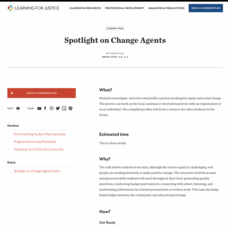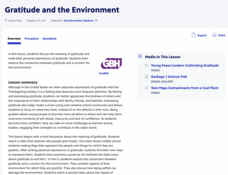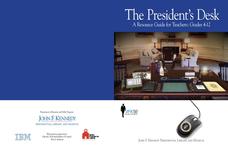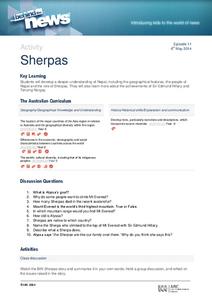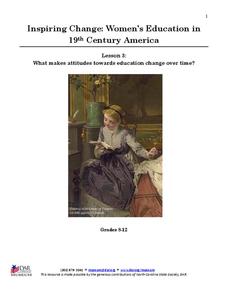Curated OER
The Black Death and HIV/AIDS: Which is the Worse Plague?
Exploring the similarities and differences between the Black Death and HIV/AIDS, students write persuasive essays answering which is the "worse plague." This cross-curricular activity between Language Arts and Social Studies addresses...
Council for Economic Education
What Makes an Entrepreneur?
What do the founders of Wendy's and Virgin Airlines have in common? They are both entrepreneurs! Key definitions and case studies help learners brainstorm their own definitions of what it takes to succeed in business. A series of...
Museum of Tolerance
Can It Happen in America?: Taking Social Action
Class members investigate the Jim Crow Laws, Executive Order 9066, the Chinese Exclusion Act, and the Indian Removal Act to gather information about not only the challenges encountered by diverse groups of Americans, but their...
National Endowment for the Humanities
The "To Do List" of the Continental Congress
What is on your to-do list today? The second lesson of a three-part series on Lost Heroes of America investigates the laundry list of items in front of the second Continental Congress. Scholars research, analyze, and present information...
National Endowment for the Humanities
Factory vs. Plantation in the North and South
North is to factory as South is to plantation—the perfect analogy for the economy that set up the Civil War! The first lesson in a series of five helps teach beginners why the economy creates a driving force for conflict. Analysis of...
Middle Tennessee State University
The Invention of the Telephone
All of the people in your class would agree that life would be different without the invention of the telephone! Study Alexander Graham Bell's most famous and influential invention through the primary source document of his sketch of the...
Teaching Tolerance
Spotlight on Change Agents
A thought-provoking resource guides learners as they interview agents of social change and share their findings. Scholars select an individual, create questions, conduct the interview, and create a profile of the person they selected....
Theodore Roosevelt Association
Roosevelt's Legacy: Conservation
The legacy of Theodore Roosevelt carries through modern American politics, economics, foreign policy, and society. But his proudest and most profound efforts were in the world of conservation, and in preserving the natural beauty of...
Judicial Learning Center
Your 4th Amendment Rights
Americans love to learn about their rights, especially those that protect them from the government's power to invade their privacy. Young people are especially engaged by this topic. An informative lesson explores four Supreme Court...
Facing History and Ourselves
Understanding Identity
Key to social-emotional learning is understanding who we are. The first lesson in an Understanding Identity unit asks class members to consider the factors that shape one's concept of themselves, the parts of their identity they choose...
PBS
Gratitude and the Environment
A class discussion begins a two-part lesson about gratitude and the environment. In part one, learners watch a video then share their feelings about its most memorable moment. Delving deep into the meaning of gratitude, scholars create...
BrainPOP
Famous Historical Figures Lesson Plan: Who Am I?
History detectives select a famous person to research, fill a bag with items associated with their subject, then ask class members to guess the historical figure represented by the artifacts.
Curated OER
Lesson: Reflecting Social Status
More space, in this case, means more status. Kids consider the status assigned to Tlingits via house partition. They discuss a carved piece that shows household space partitioned by status. They then write their own clan stories and draw...
Staples Foundation For Learning
The President’s Desk
What stories can a desk paperweight and picture frame possibly tell us about the president of the United States? Pupils are transported to the desk of President John F. Kennedy through an engaging interactive site. The guide offers a...
National History Day
Helping Life and Aiding Death: Science, Technology, and Engineering at Work during World War I
Science, engineering, and United States history? Pupils research collections of artifacts from the Smithsonian to learn about historical scientific innovations. At the end of the lesson, they write an essay to discuss technology's...
Pulitzer Center
The Paradise Papers: A Lesson in Investigative Journalism
The Paradise Papers, a year-long research project from the International Consortium of Investigative Journalism (ICIJ) exposed how political leaders, business people, and wealthy individuals used offshore entities to avoid taxes and hide...
NPR
This Isn't Right: A History of Women in Industry
Women were in the workplace long before Rosie the Riveter pushed up her sleeve. Learn about the working options available to women during the Industrial Revolution, the Progressive Era, and the Great Depression with a instructional...
Australian Broadcasting Cooperation
Sherpas
Climbing Mount Everest is a dream for many mountaineers, and for a lucky few, it's a hard-fought accomplishment. Learn more about the important role Sherpas play in Mount Everest expeditions, including Sir Edmund Hillary's famous...
National Park Service
Discover the Mary Ann Shadd Cary House
Mary Ann Shadd Cary was an extraordinary woman, no matter the time period. Academics research the life and achievements of Mrs. Cary, who was born a free African American in 1823. The lesson uses primary sources, worksheets, written...
National Society Daughters of the American Revolution
Lesson 3: What Makes Attitudes Towards Education Change over Time?
The struggle for women's rights is not unique to this generation, or even to the 20th century. Class members explore the conflicting opinions of Alexander Graham Bell and his wife, Mabel Hubbard Bell, regarding women's pursuits of higher...
Miama-Dade County Public Schools
Patriot Day September 11, 2011
While many of our learners may recognize the date of September 11, 2001 in the United States, most will not be able to personally recall what transpired. On Patriot Day, introduce your young learners to the events, aftermath, and...
Judicial Learning Center
The Power of Judicial Review
Marbury v. Madison is arguably the most important landmark case in the history of the Supreme Court. A fact-filled lesson provides background information about the case and two others related to the concept of judicial review. Scholars...
Judicial Learning Center
The Judge and the Jury
Unless you are a lawyer, you might not understand just how unrealistic Law and Order and other legal dramas actually are. Here's a great resource to help scholars of criminology gain a more realistic perspective. The lesson outlines the...
Judicial Learning Center
The U.S. Supreme Court
How do Supreme Court justices determine which cases to consider? What happens when the Supreme Court decides not to take a case? The lesson explores important questions and others in the field of criminology. It focuses on the appeals...
Other popular searches
- Esl Social Studies Lessons
- Social Studies Lessons Rome
- Social Studies Lessons Japan
- Social Studies Lessons on Maps








